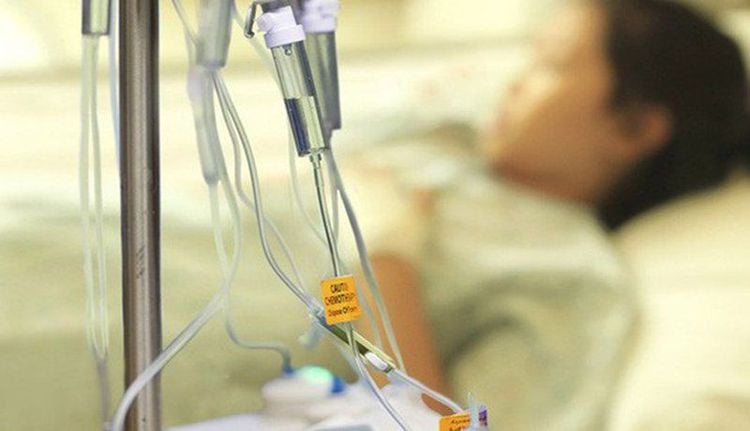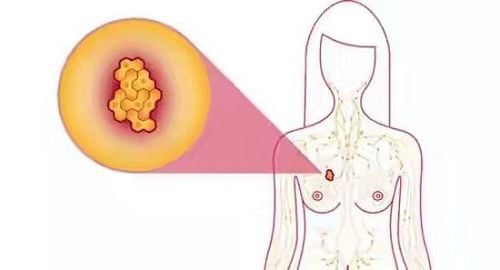This is an automatically translated article.
The article was written by MSc Quach Thanh Dung - Department of Internal Oncology - Vinmec Times City International General Hospital.Breast cancer is a common disease and the leading cause of death in women. However, the detection of the disease is quite difficult because the warning signs of breast cancer are often faint and not the same. Besides, breast cancer after treatment has a high probability of recurrence and metastasis. The disease usually occurs in the first 5 years after treatment, which is difficult and expensive to treat.
1. How to monitor breast cancer recurrence?
After finishing breast cancer treatment, you should continue to have regular follow-up and check-ups, you can do self-exams including checking both the treated breast and the rest of the breast every month. If you notice any changes, you should immediately notify the treating doctor.
Besides, during the periodical examination and follow-up, you need to have blood tests, CT scan or PET-CT scan to detect recurrence of metastases, X-ray of the other breast to detect secondary breast cancer. 2 or metastases from previous breast cancer. You should consult a geneticist. If you have a mother or first-degree relative with breast cancer you should be tested for BRCA1/2 mutations, in some cases may need mammography, biopsy for histopathology to confirm. more clearly define recurrent, metastatic breast lesions.
If the breast tumor recurs locally, alone, surgical removal of the lesion is indicated, then depending on the recurrence and metastasis, you will be treated with systemic chemotherapy or local radiotherapy.
Some symptoms to watch out for in recurrent breast cancer :
Thickening tumor in or near the breast, possibly under the armpit. Change in the size and shape of the breast. A new lump appears under the skin that feels hard to the touch. There is a change in the skin around the breast or nipple, such as wrinkled, scaly, red, or swollen skin. Blood or clear liquid coming out of the nipple. There is swelling in the chest, armpits or the area around the collarbone. May suggest tumor recurrence or lymph node metastasis. The nipple is inverted or has a change in shape. Redness or rash on the skin around the nipple. Pain. Biceps are swollen.

Along with breast self-examination, detect changes occurring in the other breast or surrounding area, or have any other symptoms such as: Chest pain, bone pain, headache, weight loss.. you need to report your condition to your doctor. Doctors will examine and perform the necessary tests to make a diagnosis and develop a specific treatment plan for you.
Trắc nghiệm: Những lầm tưởng và sự thật về ung thư vú
Ung thư vú có tỷ lệ tử vong cao nhất ở nữ giới khiến họ rất lo sợ bản thân mắc phải căn bệnh này. Tuy nhiên, không ít chị em có những hiểu biết thái quá về ung thư vú. Thử sức cùng bài trắc nghiệm sau sẽ giúp bạn loại bỏ được những nghi ngờ không đúng về căn bệnh này.
Bài dịch từ: webmd.com
2. Factors affecting breast cancer recurrence
Tumor size: The larger the tumor, the higher the chance of recurrence. Cancer has spread: If your cancer has spread to your lymph nodes, the more lymph nodes that have cancer cells, the higher your risk of recurrence. Endocrine receptors: About two-thirds of breast cancer patients have either Estrogen or Progesterone receptor hormones or both, the stronger the hormone receptor positive, the better the prognosis. This plays a role in activating the growth of cancer cells. At the histological level, the more tumor cells resemble normal cells, the higher the recurrence rate. Ki receptor 67: the higher this receptor is positive, the greater the chance of metastatic recurrence
3. Treatment of recurrent breast cancer
Breast cancer can come back near the original site, but has not spread to other parts of the body. Local recurrence is treatable. Therefore, if you notice any changes around the original incision or around the chest area, you should immediately notify the treating doctor.
Recurrent breast cancer can spread to tissues and lymph nodes around the chest, neck, and below the breastbone. Some cases of new primary breast cancer can develop in the same breast that has been treated or in the other breast.
Treatment of recurrent cancer depends on the initial treatment performed and the condition of the tumor. If the tumor recurs at the site of previous cancer or the remaining breast and can be surgically removed it is usually treated with a lumpectomy
In either case, you can use therapy endocrine, chemotherapy or radiotherapy after surgery. Usually a combination of the above methods will be used.
If breast cancer is found in the other breast, it may be a new tumor unrelated to the primary breast cancer (with differences in histopathology and endocrine receptor status, Her2 receptor compared with primary breast cancer). This will be treated as a new case of breast cancer. Depending on your stage and Her2 receptor status, you will have a lumpectomy or mastectomy, or chemotherapy before then surgery, then other treatments if necessary.
If breast cancer has spread to other parts of the body, such as the bones, lungs, liver, or brain, you may have palliative surgery, systemic chemotherapy, palliative radiation, or endocrine therapy. , Her2-targeted therapy... This depends on your hormone receptor or Her2 receptor situation.

Immunotherapy stimulates your immune system to find and destroy cancer cells. Atezolizumab is an immunotherapy drug used in combination with the chemotherapy drug Paclitaxel to block a protein called PD-L1. This treatment is available to women with metastatic breast cancer who are triple negative for the hormone receptor and Her2 receptor.
Breast cancer is a disease causing high mortality in women, the disease can be cured if detected and treated in time. In addition, each woman must protect her own health by examining and feeling for any changes in the breast and around the breast. Coming to Vinmec International General Hospital, you will be examined by leading medical experts, using modern facilities and equipment as well as advanced treatment methods in the world.
Please dial HOTLINE for more information or register for an appointment HERE. Download MyVinmec app to make appointments faster and to manage your bookings easily.
Reference source: webmd.com
SEE MORE:
6 early warning signs of breast cancer 3 breast cancer screening methods for highly accurate results Breast cancer treatments at Vinmec














